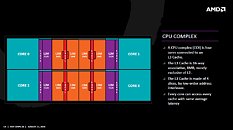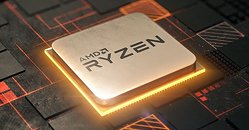Wednesday, July 25th 2018

Rumor: AMD's Zen 2, 7 nm Chips to Feature 10-15% IPC Uplift, Revised 8-core per CCX Design
A post via Chiphell makes some substantial claims on AMD's upcoming Zen 2 microarchitecture, built on the 7 nm process. AMD has definitely won the core-count war once again (albeit with a much more decisive blow to Intel's dominance than with Bulldozer), but the IPC battle has been an uphill one against Intel's slow, but sure, improvement in that area over the years. AMD did say, at the time they introduced the Zen architecture, that they had a solid understanding on Zen's choke points and its improveable bits and pieces - and took it to heart to deliver just that.A 10 to 15% improvement should bring AMD close to Intel's Kaby Lake solutions in pure per-core, single-thread performance - with the possibility for higher performance in multithreaded workloads even at the same clocks and core counts, since AMD's SMT implementation and per-core communication seems to best that of even Intel's Coffee Lake chips. Add to that the sure clock increases AMD will bring to their Zen 2 parts - you can bet the power consumption and top frequency benefits for the 7 nm manufacturing process (some estimated 1.6X logic density, ~20% speed improvement, and ~40% power reduction compared to TSMC's 10 nm process) won't go to waste when they can be used for an even greater performance uplift.Add to that the possibility -also posted via the Chiphell thread) of a per-CCX core-count increase of 8 cores per CCX (with 16-core parts being available for the consumer products) and a purely hypothetical claim for the performance crown now seems not only plausible, but likely.
Sources:
Chiphell, TSMC


108 Comments on Rumor: AMD's Zen 2, 7 nm Chips to Feature 10-15% IPC Uplift, Revised 8-core per CCX Design
1.6 density 10 to 7 nm
3.2 density 16 to 7 nm
this is hudge improvement.
I got an X470 bios update in anticipation of the B450 motherboard releases, B350/X370 still seem to be receiving updates, but not as often.
AMD better keep on the pressure, they are winning only half of my wallet though (the rest is going to nVidia sadly (note that's how they stylized it back in the old days). I got sick of Intel sitting on their asses since Sandy Bridge.
If Intel improves their yields or goes MCM and gets soldering back on, they can hold it down or push the competitors back to obscurity. (I've yet to see ARM do anything that benefits a desktop/laptop user)
It's like the Renaissance of CPU's right now or something and it feels good. I forgot if there's anything else left after MCM design that could make everything better (except latency, that's a harsh mistress).
I would believe those cards are competitive, but they are not when it comes to price. The lucky few that got those cards at decent price, made a good purchase though.
Also right now, considering a Vega 56 costs £100 or more in my country compared to a similarly performing GTX 1070 that has more overclocking headroom, while producing less heat. Ehhh. This is why my own rig right now is sporting a GeForce, it doesn't make a good decision to buy something that is lesser in most aspects, as a consumer I made the choice that made most sense to me. I have a Freesync monitor though, but I can't take full advantage of it. So that sucks. And nVidia sure as hell won't support free adaptive sync, because G-Sync monitors are making them lots of money I guess. I've read too many people having Freesync monitors and a GeForce but not a G-Sync monitor and a Radeon (Hmm, I wonder why?).
The prices are still not low enough for something that is going to be replaced very soon. I mean we just hit MSRP pricing for "new" parts a moment ago. How old these architectures actually are? Oh well, just about 2 years! And it's going to get worse, we'll have to wait ages and the pricing is going to be up the bum for "mid-range parts" like the GTX 1070Ti/1080.
Vega isn't bad, it just doesn't compete well. Drivers are really good, but. And there's always a but, game developers choose nVidia to optimize for, and subjectively most of the titles I play run better on a GeForce card right now (that could change in a year or two). (Finewine was a thing during Fiji and Hawaii era) But seriously, RTG needs to drop GCN. Like now. It worked for their GPU's in the past but now it's like AMD is parading its corpse around for everyone to see.
At first I didn't like the decision of nVidia not putting full-fat hardware support for DX12, but it seems they were right not to bother adding it in Pascal as developers made a bunch of half-assed DX12 patches that sometimes made the game engine run worse than DX11.
With Intel trying to put Vulkan into the spotlight, I hope AMD tries to make good on that promise they made when it was said they are working with more game developers. I need that extra FPS and lower latency, okay? Please.
Putting HBM2 on Vega was a curse and a blessing, I hope with GDDR6, RTG can come up with something good. But they have to release it quick after nVidia, so they know exactly what they are up against, otherwise if RTG releases a card first, nVidia can just leapfrog it while keeping the untapped performance and optimizations for later generations (remember, they already have working Volta and Turing), thus screwing the consumer out of extra performance that we could have had. It's a waiting game right now. For them and for us.
Or they know their moves exactly, because the two CEO's know each other and are going to be laughing their asses off (Papa Jensen Huang and Mama Lisa-Su :laugh:). There are a few scenarios, one thing is for sure, it is interesting to watch.
Anyway the thread isn't about GPU's but it's my own fault of being lured by a chance to see everything how it was, is and could be. On a lighter note, just try to buy something that makes most sense, hope you don't get hit by that buyers remorse and be happy.
My rig is screaming no disassemble right now. Because I need to change the power supply and it thinks I want to "kill" it.
420th post! :lovetpu:
Time for a new PC.
As for the topic of the thread, I like the rumors but I will always be wary with AMD rumors. With the initial Ryzen parts they managed to smash expectations, but there have been many times before where the rumors were too good to be true and everyone was left disappointed.
It will take a lot of effort for AMD to become on par with Intel on IPC. It will probably not happen in one iteration, and AMD's primary focus is on core count at the moment. The areas which makes Intel's architecture better does cost a lot of die space, especially the front-end/prefetcher, but also improvements to the memory controller and cache. AVX is of course not a part of IPC, but is another area where AMD have a large room for improvements, and such improvements will cost a lot of die space.People always blame the software when AMD doesn't perform competitively. The truth is that more top games are pure console ports these days, and the overall bias in games is tilting in favor of AMD.
AMD is unfortunately focused on custom chips these days, and it looks like the next GPU iteration Navi will be another minor tweak designed for consoles. Navi looks like very bad news for PC gamers. It also worries me that AMD have planned like ~5 iterations of Zen, let's hope it doesn't end up like GCN did.
Zen's IPC is already on par with something like Coffee Lake , minus AVX.
It would be so bad that it's likely AMD's cheap R5 3600 would beat Intel's $450+ 8-core i9 at EVERYTHING. We will have to wait and see of course, but if this rumor is true - game over at every price point and use case.
P.S. Is everyone around here still unaware that Intel currently has 15% lower IPC than AMD if you use the fastest RAM? (See attachment)I think this is what we can expect in 2019:
1) Excellent CPU products from AMD, it will be "AMD's Sandybridge moment." Tons of people will likely upgrade their rigs to Ryzen 3, and AMD will finally capture a large amount of Laptop and Server marketshare.
2) Incredible price gouging from Nvidia. 2019-2020 is likely going to be one of the darkest periods in history for PC graphics. Current rumors suggest AMD will be launching a 12nm Stop-gap GPU based on Polaris with GDDR5 9gbps in Q3/4 of this year. That would only bring it up to about GTX 1070 levels, and it will probably use 120w competing with a 75w GTX 1150 Ti!
7nm Navi will launch probably by Q3 next year - but again, it is rumored to be sub 300mm^2. This is meant to be the true spiritual successor to the RX 480. It will probably cost $200 and perform between a GTX 1080 and 1080 Ti (probably just below an 1170). It will sell well and likely fix Vega's Power usage issues in gaming, but that's it! No competition above the 1160 Ti. Big Navi might not launch till 2020, and there are even rumors it will be canceled....
The only things that will be make me optimistic is if AMD launches a "Titan Volta-like" 7nm Vega 96 in Q1 of next year, and then Navi over-performs expectations by a large margin. I certainly hope so or the 1180 Ti will be $1200, and the Titan will be $2000....
Currently 8700K and 2700X go head to head in most high end user decisions, and that's good. but, intel is also adding 33% core count, that could shrink the multitasking differences between the two.
Both might get over 8 cores for mainstream by 2020 as well.
Why expect less than a very calculated and controlled competition? nobody likes pulling all their guns on the first act. This isn't a Cinderella story, and if you've been around for enough years you know that.
I really don't get the people who go bananas and pull hair out of their heads for every possible announcement.